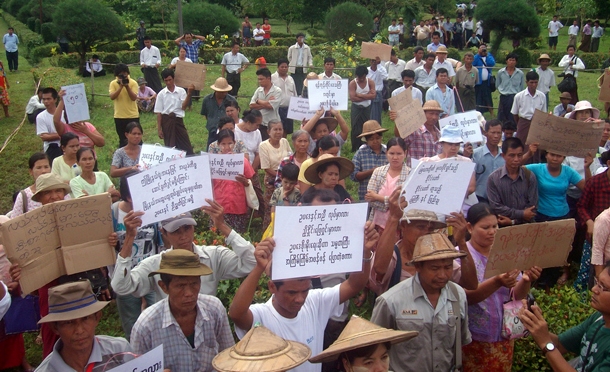RANGOON — The Myanmar National Human Rights Commission (MNHRC) has said that nearly 45 percent of the total complaints it has received this year stem from land disputes, the highest proportion of such complaints since the commission was founded three years ago.
From January to the end of August this year, 547 of a total 1,220 complaints received by the MNHRC were land disputes. Officials said that the disputes are related to the 2012 Farmlands Act, which requires farmers to seek permission to cultivate their land from their township.
“According to the new Farmlands Act, all farms are to be registered,” said Sit Myaing, secretary of the MNHRC. “Some people can’t register their farms because they are not eligible under the Act. Most of the cases are the result of people who sold their land, then they want it back when the price of the land increases—so they complain to the commission.”
Aung Kyaw Kyaw, interim Upper Myanmar advisor of the Myanmar Farmer Association, told The Irrawaddy that traditional landowners and slash-and-burn cultivation farmers in ethnic states faced difficulties in registering their farms under the Farmlands Act.
Section 12 of the Farmlands Law prevents farmers from changing crops without permission from township authorities, allowing farmland to lay fallow and mortgaging land outside of banking institutions owned or officially approved by the government.
The law empowers the Central Farmland Management Body (FMB) to levy fines and evict farmers for failing to meet the conditions of Section 12. Penalties for farmers failing to comply with an order from the FMB include a fine of up to 500,000 kyats (US$500) and a maximum jail term of two years.
Po Phyu, a lawyer and advocate for farmers with land dispute problems, told The Irrawaddy that farmers who wanted to register their farms had to continuously cultivate the land, but that they ironically need to first seek government approval.
“The 2012 Farmlands Act cannot solve these problems fully, and it makes existing problems more confusing,” he said.
From 2011 to 2014, a total of 7,113 complaints have been lodged with the MNHRC, of which 1,497 were land disputes. While these cases have figured prominently since the commission’s inception, more than a third of total land dispute complaints were filed in the first eight months of this year.
Sit Myaing said that most land disputes in 2014 have been arbitrations between local farmers, while complaints originating from military or business land seizures were more prominent in 2011-12, and were rarely presented to the commission this year.
He added that the creation in 2012 of a parliamentary committee to address these kinds of land seizures have led to complaints from landowners being directed away from the MNHRC and directly to the committee.
“The parliament organized the Farmlands Investigation Committee, which is tasked with solving farmland disputes and either giving money for compensation or returning land to farmers.”
The MNHRC was established in September 2011 and reports directly to President Thein Sein. Its membership is determined by the government and nearly all members are retired government officials.
Their mandate is to acquire information about violations of the fundamental rights of citizens under the Constitution of Burma, to investigate them and to convey the findings to relevant government departments and bodies for necessary action.
Of the 7,113 complaints received since the MNHRC’s inception, 1,900 have been referred directly to the government, and a further 1,100 complainants received reply letters instructing them on how to seek redress with specific government departments. Over 3,700 complaints have been lodged and ultimately dismissed as falling outside the purview of the commission.
After land disputes, the largest number of complaints received by the commission relate to the judicial system, followed by the financial sector and the police.

















